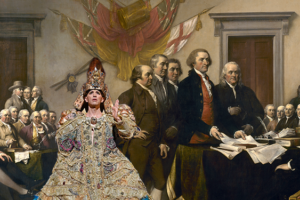
Richard Strauss’ Ariadne auf Naxos started life as a favor to the great theatrical producer Max Reinhardt who had saved the world premiere of Der Rosenkavalier in Dresden in 1911. Reinhardt was now being given his choice of a musical/theatre piece to revive for the Deutsches Theater in Berlin. His choice would be Molière’s Le Bourgeois Gentilhomme with Hugo Von Hofmannsthal providing the new adaptation of the text and Strauss contributing incidental music in the manner of Lully and a final divertissement on the classical Ariadne.
Our musical history books show us that this exciting new hybrid entertainment eventually happened at the Stuttgart Court Theatre ballooning into a nearly five hour performance that left the audience, who were there mostly for their Strauss, in a state of benumbed frustration. Even with judicious cutting in a number of other venues, including London under Sir Thomas Beecham, this version never found success.
Hofmannsthal finally lit upon the idea of dropping the Molière completely and writing a prologue to set up the action of the opera proper to explain the juxtaposition of the commedia dell’arte troupe and the grand opera figures therein. This version, premiering in Vienna in October of 1916, met with no more real success than the first in spite of featuring the original Aridane of Maria Jeritza and making a star of the relatively unknown Lotte Lehmann (substituting at the last moment) as the Composer.
It seems astonishing that it really didn’t catch on as a repertory staple until Karl Bohm started championing it in the 1960’s. Now the supreme property of soprano fanciers for whom it gives the rare opportunity to enjoy two, if not three, great Strauss stylists in the course of a single evening in a veritable ‘greatest hits’ collection of arias. We eagerly await whomever is ready to abandon themselves to the rocks of Naxos and Strauss’ opera with its endlessly unfurling streamers of melody. Some, perhaps, should have been discovered on the island a mite earlier in their careers as is the case with this new release from our friends at Decca.
Musically this performance can’t be slighted. Christian Thielemann has proved himself to be the preeminent Strauss interpreter of the current generation of conductors and he’s in striking form here. He has the reduced forces of the Staatskapelle Dresden in the pit and they have an extraordinary way with this sinewy score and its fleeting snatches of melody gathering and interlacing into the orgiastic finale we expect from Strauss’ writing.
He keeps most of the playing to modest levels so we can hear the transparencies in the writing for chamber orchestra. The keyboard players on the piano, celesta and harmonium should especially be singled out for praise. The expression on Thielemann’s face when he takes his position in the pit is almost that of childlike glee at his assignment and he shows enormous respect to the orchestra both in the pit directly at the end of the first act and at the calls. It’s a glorious musical presentation on every level and he conducts with relish.
Which may be why I was so disappointed in the direction and set design of Philippe Arlaud. The prologue starts in a vaguely Bauhaus influenced backstage area that’s really just a series of beige flats dropped down from the flies on a very shallow playing space dominated stage center by a grand piano half out of its packing crate and perched as if it’s about to slide down a small flight of risers. A full-size make-up mirror takes up stage left. Arlaud just keeps the whole thing as busy as possible with a small army of backstage people having a multitude of interactions distracting from the actual plot. Some of it’s funny, especially when a character opens its mouth to speak who you know doesn’t actually have any lines and then gets interrupted.
The beige flats get pulled up for the opera proper to reveal even more of them on the Busby Berkeley staircase leading upstage in true MGM fashion. The evening’s guests seated on the top most levels watching the action below. It’s all enormously sterile with moderne office furniture chairs scattered about. A big wooden crate center stage with the word “Insel” stencilled on it hardly challenges those of us who don’t speak German but are good guessers.
Andrea Uhmann provides the mostly monochromatic costumes that make up for in good taste what they lack in creativity.
I was pleasantly surprised to see the venerable René Kollo, no stranger to the Island of Naxos himself and dapper in his grey morning coat, as the Major Domo. He knows how to do imperious. He also plays well off of the Music Master of Eike Wilm Schulte who’s exactly the kind of seasoned pro you want in that part.
The commedia dell’arte players have some good staging moments but nothing inspiring and the Harlequin of Nikolay Borchev reveals a virile, if unsettled, bantam-weight baritone that perhaps hasn’t found its core sound yet. He handles his little solo in the opera well but didn’t erase any memories I had of more polished interpreters. The rest of the bunch are just Laurel & Hardy all over the place and some of it’s funny. Ditto the trio of Naiad, Dryad and Echo who are all efficient singers but have been given a mountain of distracting stage business to carry out.
Who knew that if you put a black curly wig on Sophie Koch and added a dark suit that she comes out looking exactly like Gustavo Dudamel? It’s a funny, and wholly apt, coincidence that Arlaud couldn’t help exploiting and it gives her performance as the Composer a uniqueness that made it feel more current than usual. Koch sings the role beautifully and avoids the browbeaten quality that some mezzos acquire because of it’s high tessitura. I especially enjoyed her exchanges with the Zerbinetta but disliked the fact that the director keeps insinuating her silently into the action of the opera proper. They try too hard and just don’t make it work.
What does work, and almost perfectly at that, is the Zerbinetta of Jane Archibald. With her Louise Brooks bob, ostrich feathered skirt and Bob Mackie sequined halter top, she squares her shoulders and conquers the stage with sheer zest. The voice is very firm and brilliant on top. She is given a lot of business in her big showpiece “Großmächtige Prinzessin’”—so much in fact that some of the gags don’t come off.
She has trouble untying some gloves from where they’ve been fastened (slap the prop man backstage) and a love note that she’s supposed to snatch from the trombone player’s slide flutters into the pit before she can catch it, murdering what should have been a cute bit. But much of it is charming and she makes the best of every moment she’s on stage. If she lacks the laser pointer staccatos of Gruberova and Dessay or, if her pitch very occasionally strays she certainly makes up for it in verve. She’s especially funny and adept at insinuating herself into Ariadne’s personal space to the latter’s very comic disapproval. Brava!
Robert Dean Smith makes a very good showing in the generally thankless role of The Tenor/Bacchus. At his first entrance in the opera he starts carefully but then, who can blame him? It’s a short but strenuous sing that most tenors of his ilk avoid with the same avidity they do Wagner’s Siegfried. He gets his sea legs fairly quickly though and rises to full Heldentenor geschrei. I heard him as the Emperor in Frosch in LA not too long ago and his singing is very easy on the ears compared to some in his repertoire. Even in the highest reaches he still keeps the stress out of his throat and an open tone. The costume designer throws a Roman sash/toga around his beige business suit to denote his lofty status which works well enough. After leaving half his voice on the stage he’s nearly defeated by his final phrase but he’s in good company there.
Which brings us to our evening’s strandee, Renèe Fleming. The Beautiful Voice announced early on that this would be her only staged Aridane which I think is a shame because there’s room for improvement. Also, knowing that the production was being filmed for posterity perhaps raises expectations unnaturally high.
I’m an enormous fan of Ms. Fleming and I think some of her early work with Robert Carsen was among her best. I appreciated how she enjoyed singing repertoire slightly off the beaten path and acted as an astute technician for her strong lyric-spinto voice. I especially enjoyed how she keeps the bottom half of the voice hooked up to the top instead of essentially ignoring it the way some lazy sopranos do. She’s certainly made an indelible impression in the Strauss oeuvre and this performance won’t affect her stature in that holy shrine.
But I do wish we’d found her on the island of Naxos perhaps ten years earlier. But then I could give you a list of the singers I’ve said that about over the years. The role of Ariadne, while short, is a virtual breathalyzer test for sopranos. You want a resplendent voice like Iguazu Falls, just torrents of sound. After singing almost nothing in the short prologue practically the first thing out of her mouth in the opera itself is the opening phrase of “Ein schönes war.” The length of this phrase would make mere mortals call for an oxygen tank and the attendance of a nurse. She does not disappoint. But the early part of the act finds her off her form slightly and not able to match up the extremes of Strauss’ rollercoaster tesitura.
She’s striving to make the voice work at the climactic ascending phrase of “Es gibt ein Reich” and halfway through the scale she actually takes a catch breath when she thinks no one’s looking (?). Beloveds, she gasped and then so did I. If you’ve never heard the aria before she’s so cunning about how she does it (turning oh so slightly upstage) I don’t think you’d notice but it’s there. Forever. By the time she’s into the duet with the tenor you can tell she’s firing on all cylinders and she’s gotten her second wind (or first, as the case may be). The rest of her performance is as refulgent as you want it to be except for an oddly phrased final “Was hängt von mir” that’s a little more prosaic than poetic.
She’s genuinely funny in her interplay with the Zerbinetta and especially her exasperation as she’s led around the stage and lectured about the male sex but the old school grandezza we expect in the prologue, and most of the opera frankly, doesn’t come naturally to her. Her arias, which should find her lost in reverie, are played straight out to the audience and it’s a shame to find a singer who’s commonly criticized for an over-emotional performance style, which I enjoy, slightly under-powered.
My biggest bone of contention, however, is with the wretched job that Brian Large does with directing the video version of this performance. I don’t know if he is preemptively trying to shield the home viewer from an overly fussy production but that’s not his job. He rarely moves the camera out of a two shot and you hardly ever see the entire stage, especially in the prologue. It’s disorienting to never get a feeling for the set or the layout. The finale is almost completely scuppered by this approach and it just left me completely scratching my head. There’s a lot going on and we only get a sidelong glance at times.
The Blu-ray picture is razor-sharp and especially good with the bright lighting and metallic costumes. Sound could have been a bit better at times but, frankly, I blame the miking there. No extra features and of course subtitles in English, French, Spanish, Chinese and German (if you want to sing along). There’s a lot of competition in the catalog with this title and I wouldn’t say it’s my favorite but for fans of La Renèe this is our only chance to see her on the island of Naxos.
























Comments